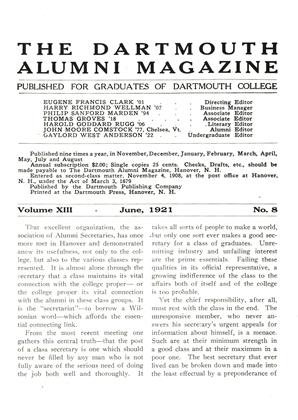What is perhaps the greatest opportunity for service to Dartmouth is the recent disbandment of the two sophomore secret societies and their amalgamation into a non-secret honorary organization whose sole purpose according to the constitution, is service to the College.
For several years there have existed on the side two secret sophomore societies. These have never received any official recognition, their pledges have never been announced, nor their list of members published. Whatever their nominal purpose may have been it has not been one of service; indeed many have considered them to be detriments to college spirit. What their effect has been is a matter of no importance for they are now disbanded. But it must be noted that this disbandment has been at the decision of the societies themselves.
Now that this union has taken place and the new society, known as The Green Key, has come out into the open and published its constitution, the college may well look for improvements. According to the constitution the objects of the organization are "(a) to provide for the entertainment of the representatives of other institutions while guests of the college; (b) to act as a permanent vigilance committee; and (c) to select from their membership the men who are to compete for the offices of head cheerleader and head usher."
Here are other worthy aims, the first two of which are indisputably high. Dartmouth has long felt that something should be done for the entertainment of visiting teams. Too often have these slipped into Hanover and then slipped out again, unnoticed except during the game, and carrying away with them a feeling of inhospitality. The new organization, modelled in this respect after the society at the University of Washington which overwhelmed the football team with courtesy after courtesy, should remedy this matter, and if well directed make Dartmouth known for its hospitality.
The second purpose of serving as a sophomore vigilance committee is highly commendatory. For too long has this committee included in its membership men who are distinct detriments to the best interests of the college. Men who as freshmen, walked as close to the line as they dared and often "got away' with many violations of rules, and who as sophomeres were determined that the new class should toe the mark most carefully, have almost invariably found a place on this committee. In the execution of their "duties" these same men have often been as mean and as obnoxious as possible. Such a condition was possible under the old system, for the personnel of the committee was kept a secret and membership was in no sense an honor. Now that these duties have been taken over by a non-secret 'society which aims to include the best men of the class, there should be a marked improvement, both in the administration of the rules and the respect of the freshmen for these rules. When membership is an honor, the obnoxious sophomore will no longer find a place.
The third purpose of The Green Key is open to criticism. They propose that from their membership shall be chosen the men who are to compete for head cheerleader and head usher. At the end of the sophomore year the society shall reduce the number competing to three, and at the close of the following year Palaeopitus shall elect one man for each position. This plan is still subject to the ratification of the athletic and non-athletic councils which at present are vested with the power of selection. It is to be hoped that some modification will be made so that the man who is outside the membership of the soceity may have an opportunity to compete for these positions. To debar him would be an obvious injustice.
Starting out with such high aims and purposes the question of success is entirely up to the members. According to the constitution Palaeopitus is given some jurisdiction in the matter of amendments and expenditures. The actual execution, however, is up to the society. As The Dartmouth has suggested, they must use care and discretion in the picking of members. The limiting of the membership to 56, with a minimum of 40, and public bidding and initiation, will do much to insure a personnel of uniformly high calibre.
The Green Key has here an opportunity to do Dartmouth a real service, to add honor to the college, and to improve undergraduate spirit. The unselfishness with which the two rival societies gave up their petty aims and joined together .speaks well for the future. The undergraduate body approves of the new move and will give them their wholehearted support so far as is needed. It is now entirely up to the sophomores.
 View Full Issue
View Full Issue














